A New Line of Testing & Maintenance Stations For Night Vision Devices
| 16/05/2017
Israeli night vision device manufacturer Troya Tech Defense has recently developed a series of testing stations for its products which can also be used to test NVDs by other manufacturers.
IAF to Replace Manned Sea Scan Fleet with IAI's Heron 1 UAS
| 16/05/2017
The Israeli Air Force (IAF) is replacing its manned Sea Scan maritime patrol aircraft with Israel Aerospace Industries' (IAI) maritime version of the Heron 1 (Shoval) unmanned air system.
The IAF ordered additional Heron 1 UAV Systems equipped with a maritime radar and electro-optical payload that will make them more suitable for their growing role in carrying out maritime patrol and intelligence gathering missions on everyday bases.
UVision Unveils Hero-400 Loitering Platform at the Ground Warfare & Logistics Conference
| 16/05/2017
Loitering platform makes its debut appearance: the Hero-400 long-range loitering platform has been presented to the public for the first time at the exhibition complementing the Second International Ground Warfare & Logistics Conference opened today and ending on May 18 at the IDF Armored Corps Memorial Center in Latrun.
The 2nd International Ground Warfare and Logistics Conference is Underway
| 16/05/2017
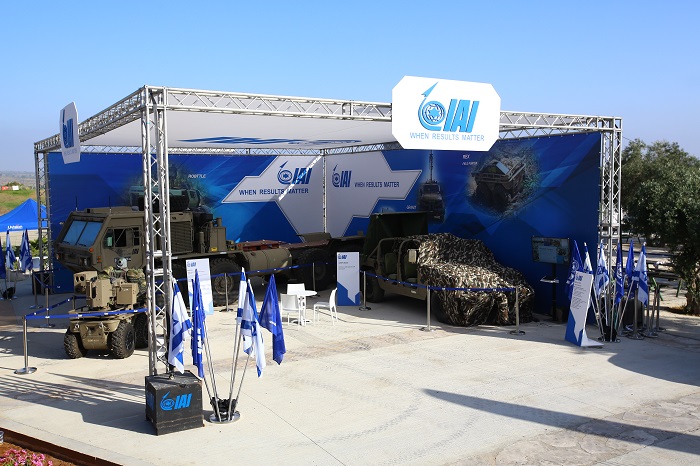
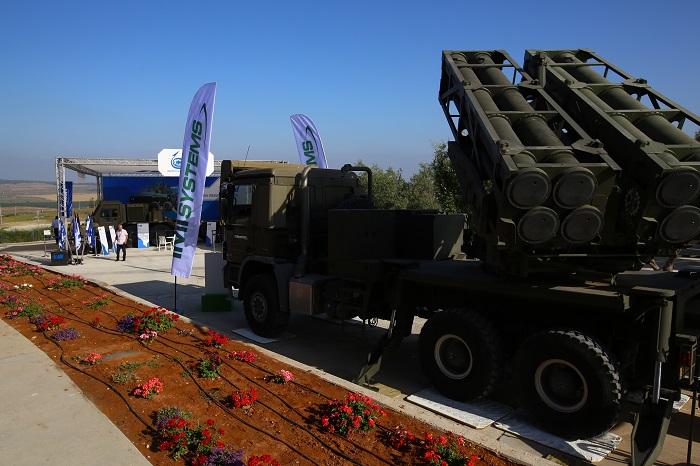
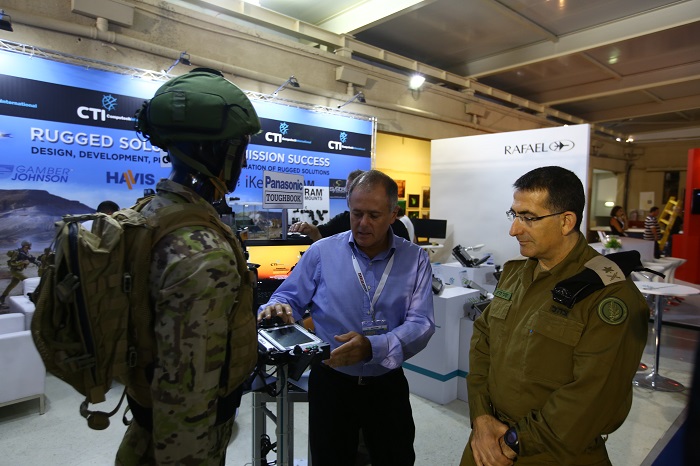
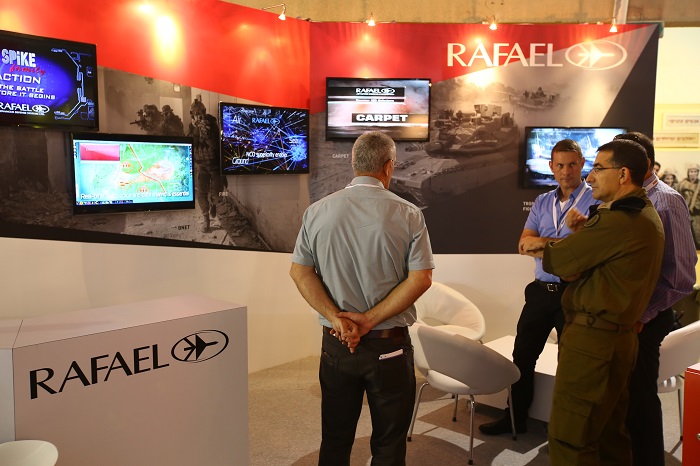
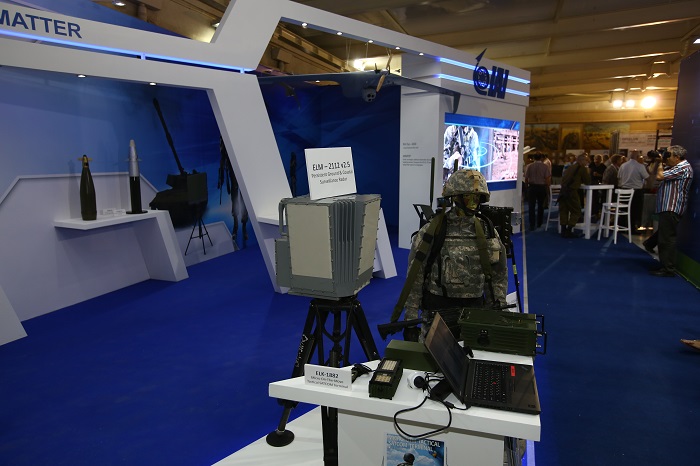
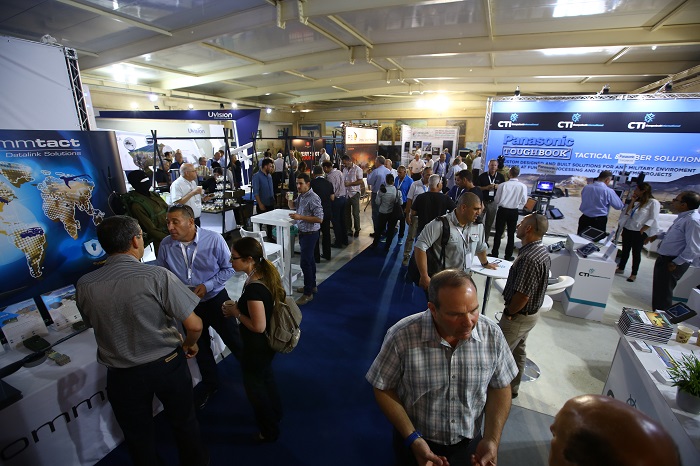

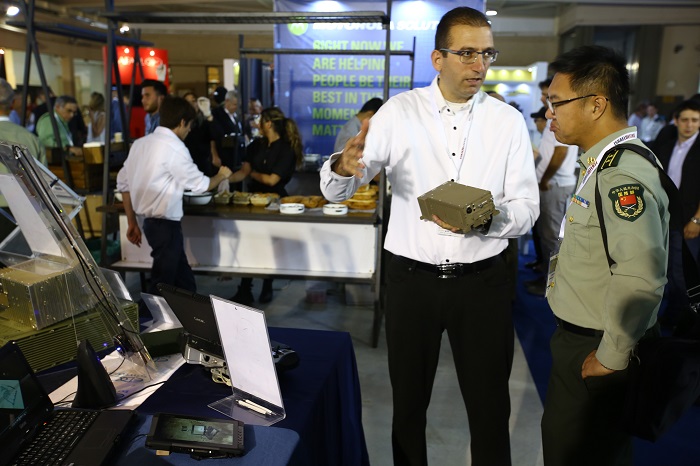
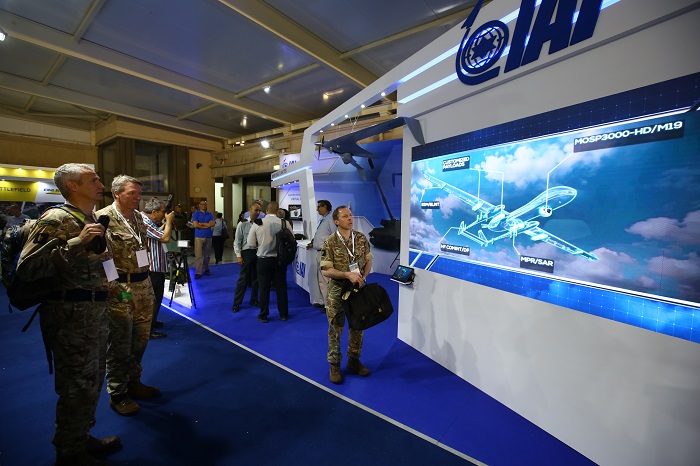
US State Department: Syria Built Crematorium to Hide Executions
| 15/05/2017
The United States has evidence the regime of Syrian President Bashar al-Assad has built a crematorium at a large military prison outside the capital Damascus, a State Department official said on Monday.
Stuart Jones, the acting assistant secretary for Near Eastern Affairs, said US officials believe the crematorium would be used to dispose of bodies at a prison, where they believe Assad's government authorized the mass hangings of thousands of inmates during Syria's civil war.
CONTROP Signs Multiple Contracts to Provide iSea EO/IR Maritime Payloads to Customers Worldwide
| 15/05/2017
CONTROP Precision Technologies – an Israeli company specializing in the field of electro-optics (EO) and infrared (IR) defense and homeland security solutions for maritime, airborne and land installations, recently delivered iSea-30HD maritime payloads to the Australian Border Force for maritime regulation applications. Additionally, CONTROP reports sale of iSea-50HD high-definition camera systems for Patrol Boats to a customer in Asia and several additional iSea-20 and iSea-30 maritime systems to international customers.
IAI Completes Installation of ALPHA Surveillance Radars on Israeli Missile Ships
| 15/05/2017
Israel Aerospace Industries (IAI) has recently completed the installation of the ALPHA (Advanced Lightweight Phased Array) ELM-2258 radar system on the Israeli Navy's Sa'ar 4.5 missile ship and has proceeded to operational sea trials.
The Israeli Navy is expected to receive two additional ALPHA radars by the end of 2017, reaching a total of 11 systems to be installed on the Navy's missile ships. The lightweight radar system is based on IAI/ELTA's fully digital AESA technology and is an integral part of the combat systems installed on the missile ships.
Did Israelis Sell Thermal Weapon Sights to South Sudan?
| 15/05/2017
A story that has been circulating in recent months revolves around an affair involving an Israeli mediator, two Israeli companies, a subsidiary in Africa, and a deal in South Sudan. Due to the sensitive nature of the case, the identity of the persons and companies involved will not be disclosed.
The Future Armored Vehicles of the IDF
| 15/05/2017
"The development of the Merkava tank was initiated mainly because of the Arab boycott on Israel in the 1960s and 1970s," explains Brig. Gen. Baruch Matzliach, Commander of the Tank Program Administration (MANTAK) at the Israel Ministry of Defense (IMOD). "Back then, only five countries worldwide manufactured tanks, and none of them wanted to sell (tanks) to Israel owing to the Arab pressure. The objective of the IDF was to acquire a new tank that would replace the old Centurion and Patton tanks opposite the modern Soviet-built tanks the Arab countries had acquired.
IDF Scraps Plans for a Unified Cyber Command
| 15/05/2017
The Israel Defense Forces is officially abandoning plans for a unified Cyber Command meant to bring the military’s online activities under one roof, keeping its cyber-defense arm separate from its intelligence collection division, in a reorganization the army says reflects improved electronic warfare capabilities, a senior official said Sunday
Israeli night vision device manufacturer Troya Tech Defense has recently developed a series of testing stations for its products which can also be used to test NVDs by other manufacturers.
IAF to Replace Manned Sea Scan Fleet with IAI's Heron 1 UAS
| 16/05/2017
The Israeli Air Force (IAF) is replacing its manned Sea Scan maritime patrol aircraft with Israel Aerospace Industries' (IAI) maritime version of the Heron 1 (Shoval) unmanned air system.
The IAF ordered additional Heron 1 UAV Systems equipped with a maritime radar and electro-optical payload that will make them more suitable for their growing role in carrying out maritime patrol and intelligence gathering missions on everyday bases.
UVision Unveils Hero-400 Loitering Platform at the Ground Warfare & Logistics Conference
| 16/05/2017
Loitering platform makes its debut appearance: the Hero-400 long-range loitering platform has been presented to the public for the first time at the exhibition complementing the Second International Ground Warfare & Logistics Conference opened today and ending on May 18 at the IDF Armored Corps Memorial Center in Latrun.
The 2nd International Ground Warfare and Logistics Conference is Underway
| 16/05/2017









US State Department: Syria Built Crematorium to Hide Executions
| 15/05/2017
The United States has evidence the regime of Syrian President Bashar al-Assad has built a crematorium at a large military prison outside the capital Damascus, a State Department official said on Monday.
Stuart Jones, the acting assistant secretary for Near Eastern Affairs, said US officials believe the crematorium would be used to dispose of bodies at a prison, where they believe Assad's government authorized the mass hangings of thousands of inmates during Syria's civil war.
CONTROP Signs Multiple Contracts to Provide iSea EO/IR Maritime Payloads to Customers Worldwide
| 15/05/2017
CONTROP Precision Technologies – an Israeli company specializing in the field of electro-optics (EO) and infrared (IR) defense and homeland security solutions for maritime, airborne and land installations, recently delivered iSea-30HD maritime payloads to the Australian Border Force for maritime regulation applications. Additionally, CONTROP reports sale of iSea-50HD high-definition camera systems for Patrol Boats to a customer in Asia and several additional iSea-20 and iSea-30 maritime systems to international customers.
IAI Completes Installation of ALPHA Surveillance Radars on Israeli Missile Ships
| 15/05/2017
Israel Aerospace Industries (IAI) has recently completed the installation of the ALPHA (Advanced Lightweight Phased Array) ELM-2258 radar system on the Israeli Navy's Sa'ar 4.5 missile ship and has proceeded to operational sea trials.
The Israeli Navy is expected to receive two additional ALPHA radars by the end of 2017, reaching a total of 11 systems to be installed on the Navy's missile ships. The lightweight radar system is based on IAI/ELTA's fully digital AESA technology and is an integral part of the combat systems installed on the missile ships.
Did Israelis Sell Thermal Weapon Sights to South Sudan?
| 15/05/2017
A story that has been circulating in recent months revolves around an affair involving an Israeli mediator, two Israeli companies, a subsidiary in Africa, and a deal in South Sudan. Due to the sensitive nature of the case, the identity of the persons and companies involved will not be disclosed.
The Future Armored Vehicles of the IDF
| 15/05/2017
"The development of the Merkava tank was initiated mainly because of the Arab boycott on Israel in the 1960s and 1970s," explains Brig. Gen. Baruch Matzliach, Commander of the Tank Program Administration (MANTAK) at the Israel Ministry of Defense (IMOD). "Back then, only five countries worldwide manufactured tanks, and none of them wanted to sell (tanks) to Israel owing to the Arab pressure. The objective of the IDF was to acquire a new tank that would replace the old Centurion and Patton tanks opposite the modern Soviet-built tanks the Arab countries had acquired.
IDF Scraps Plans for a Unified Cyber Command
| 15/05/2017
The Israel Defense Forces is officially abandoning plans for a unified Cyber Command meant to bring the military’s online activities under one roof, keeping its cyber-defense arm separate from its intelligence collection division, in a reorganization the army says reflects improved electronic warfare capabilities, a senior official said Sunday
The Israeli Air Force (IAF) is replacing its manned Sea Scan maritime patrol aircraft with Israel Aerospace Industries' (IAI) maritime version of the Heron 1 (Shoval) unmanned air system.
The IAF ordered additional Heron 1 UAV Systems equipped with a maritime radar and electro-optical payload that will make them more suitable for their growing role in carrying out maritime patrol and intelligence gathering missions on everyday bases.
UVision Unveils Hero-400 Loitering Platform at the Ground Warfare & Logistics Conference
| 16/05/2017
Loitering platform makes its debut appearance: the Hero-400 long-range loitering platform has been presented to the public for the first time at the exhibition complementing the Second International Ground Warfare & Logistics Conference opened today and ending on May 18 at the IDF Armored Corps Memorial Center in Latrun.
The 2nd International Ground Warfare and Logistics Conference is Underway
| 16/05/2017









US State Department: Syria Built Crematorium to Hide Executions
| 15/05/2017
The United States has evidence the regime of Syrian President Bashar al-Assad has built a crematorium at a large military prison outside the capital Damascus, a State Department official said on Monday.
Stuart Jones, the acting assistant secretary for Near Eastern Affairs, said US officials believe the crematorium would be used to dispose of bodies at a prison, where they believe Assad's government authorized the mass hangings of thousands of inmates during Syria's civil war.
CONTROP Signs Multiple Contracts to Provide iSea EO/IR Maritime Payloads to Customers Worldwide
| 15/05/2017
CONTROP Precision Technologies – an Israeli company specializing in the field of electro-optics (EO) and infrared (IR) defense and homeland security solutions for maritime, airborne and land installations, recently delivered iSea-30HD maritime payloads to the Australian Border Force for maritime regulation applications. Additionally, CONTROP reports sale of iSea-50HD high-definition camera systems for Patrol Boats to a customer in Asia and several additional iSea-20 and iSea-30 maritime systems to international customers.
IAI Completes Installation of ALPHA Surveillance Radars on Israeli Missile Ships
| 15/05/2017
Israel Aerospace Industries (IAI) has recently completed the installation of the ALPHA (Advanced Lightweight Phased Array) ELM-2258 radar system on the Israeli Navy's Sa'ar 4.5 missile ship and has proceeded to operational sea trials.
The Israeli Navy is expected to receive two additional ALPHA radars by the end of 2017, reaching a total of 11 systems to be installed on the Navy's missile ships. The lightweight radar system is based on IAI/ELTA's fully digital AESA technology and is an integral part of the combat systems installed on the missile ships.
Did Israelis Sell Thermal Weapon Sights to South Sudan?
| 15/05/2017
A story that has been circulating in recent months revolves around an affair involving an Israeli mediator, two Israeli companies, a subsidiary in Africa, and a deal in South Sudan. Due to the sensitive nature of the case, the identity of the persons and companies involved will not be disclosed.
The Future Armored Vehicles of the IDF
| 15/05/2017
"The development of the Merkava tank was initiated mainly because of the Arab boycott on Israel in the 1960s and 1970s," explains Brig. Gen. Baruch Matzliach, Commander of the Tank Program Administration (MANTAK) at the Israel Ministry of Defense (IMOD). "Back then, only five countries worldwide manufactured tanks, and none of them wanted to sell (tanks) to Israel owing to the Arab pressure. The objective of the IDF was to acquire a new tank that would replace the old Centurion and Patton tanks opposite the modern Soviet-built tanks the Arab countries had acquired.
IDF Scraps Plans for a Unified Cyber Command
| 15/05/2017
The Israel Defense Forces is officially abandoning plans for a unified Cyber Command meant to bring the military’s online activities under one roof, keeping its cyber-defense arm separate from its intelligence collection division, in a reorganization the army says reflects improved electronic warfare capabilities, a senior official said Sunday
Loitering platform makes its debut appearance: the Hero-400 long-range loitering platform has been presented to the public for the first time at the exhibition complementing the Second International Ground Warfare & Logistics Conference opened today and ending on May 18 at the IDF Armored Corps Memorial Center in Latrun.
The 2nd International Ground Warfare and Logistics Conference is Underway
| 16/05/2017









US State Department: Syria Built Crematorium to Hide Executions
| 15/05/2017
The United States has evidence the regime of Syrian President Bashar al-Assad has built a crematorium at a large military prison outside the capital Damascus, a State Department official said on Monday.
Stuart Jones, the acting assistant secretary for Near Eastern Affairs, said US officials believe the crematorium would be used to dispose of bodies at a prison, where they believe Assad's government authorized the mass hangings of thousands of inmates during Syria's civil war.
CONTROP Signs Multiple Contracts to Provide iSea EO/IR Maritime Payloads to Customers Worldwide
| 15/05/2017
CONTROP Precision Technologies – an Israeli company specializing in the field of electro-optics (EO) and infrared (IR) defense and homeland security solutions for maritime, airborne and land installations, recently delivered iSea-30HD maritime payloads to the Australian Border Force for maritime regulation applications. Additionally, CONTROP reports sale of iSea-50HD high-definition camera systems for Patrol Boats to a customer in Asia and several additional iSea-20 and iSea-30 maritime systems to international customers.
IAI Completes Installation of ALPHA Surveillance Radars on Israeli Missile Ships
| 15/05/2017
Israel Aerospace Industries (IAI) has recently completed the installation of the ALPHA (Advanced Lightweight Phased Array) ELM-2258 radar system on the Israeli Navy's Sa'ar 4.5 missile ship and has proceeded to operational sea trials.
The Israeli Navy is expected to receive two additional ALPHA radars by the end of 2017, reaching a total of 11 systems to be installed on the Navy's missile ships. The lightweight radar system is based on IAI/ELTA's fully digital AESA technology and is an integral part of the combat systems installed on the missile ships.
Did Israelis Sell Thermal Weapon Sights to South Sudan?
| 15/05/2017
A story that has been circulating in recent months revolves around an affair involving an Israeli mediator, two Israeli companies, a subsidiary in Africa, and a deal in South Sudan. Due to the sensitive nature of the case, the identity of the persons and companies involved will not be disclosed.
The Future Armored Vehicles of the IDF
| 15/05/2017
"The development of the Merkava tank was initiated mainly because of the Arab boycott on Israel in the 1960s and 1970s," explains Brig. Gen. Baruch Matzliach, Commander of the Tank Program Administration (MANTAK) at the Israel Ministry of Defense (IMOD). "Back then, only five countries worldwide manufactured tanks, and none of them wanted to sell (tanks) to Israel owing to the Arab pressure. The objective of the IDF was to acquire a new tank that would replace the old Centurion and Patton tanks opposite the modern Soviet-built tanks the Arab countries had acquired.
IDF Scraps Plans for a Unified Cyber Command
| 15/05/2017
The Israel Defense Forces is officially abandoning plans for a unified Cyber Command meant to bring the military’s online activities under one roof, keeping its cyber-defense arm separate from its intelligence collection division, in a reorganization the army says reflects improved electronic warfare capabilities, a senior official said Sunday
US State Department: Syria Built Crematorium to Hide Executions
| 15/05/2017
The United States has evidence the regime of Syrian President Bashar al-Assad has built a crematorium at a large military prison outside the capital Damascus, a State Department official said on Monday.
Stuart Jones, the acting assistant secretary for Near Eastern Affairs, said US officials believe the crematorium would be used to dispose of bodies at a prison, where they believe Assad's government authorized the mass hangings of thousands of inmates during Syria's civil war.
CONTROP Signs Multiple Contracts to Provide iSea EO/IR Maritime Payloads to Customers Worldwide
| 15/05/2017
CONTROP Precision Technologies – an Israeli company specializing in the field of electro-optics (EO) and infrared (IR) defense and homeland security solutions for maritime, airborne and land installations, recently delivered iSea-30HD maritime payloads to the Australian Border Force for maritime regulation applications. Additionally, CONTROP reports sale of iSea-50HD high-definition camera systems for Patrol Boats to a customer in Asia and several additional iSea-20 and iSea-30 maritime systems to international customers.
IAI Completes Installation of ALPHA Surveillance Radars on Israeli Missile Ships
| 15/05/2017
Israel Aerospace Industries (IAI) has recently completed the installation of the ALPHA (Advanced Lightweight Phased Array) ELM-2258 radar system on the Israeli Navy's Sa'ar 4.5 missile ship and has proceeded to operational sea trials.
The Israeli Navy is expected to receive two additional ALPHA radars by the end of 2017, reaching a total of 11 systems to be installed on the Navy's missile ships. The lightweight radar system is based on IAI/ELTA's fully digital AESA technology and is an integral part of the combat systems installed on the missile ships.
Did Israelis Sell Thermal Weapon Sights to South Sudan?
| 15/05/2017
A story that has been circulating in recent months revolves around an affair involving an Israeli mediator, two Israeli companies, a subsidiary in Africa, and a deal in South Sudan. Due to the sensitive nature of the case, the identity of the persons and companies involved will not be disclosed.
The Future Armored Vehicles of the IDF
| 15/05/2017
"The development of the Merkava tank was initiated mainly because of the Arab boycott on Israel in the 1960s and 1970s," explains Brig. Gen. Baruch Matzliach, Commander of the Tank Program Administration (MANTAK) at the Israel Ministry of Defense (IMOD). "Back then, only five countries worldwide manufactured tanks, and none of them wanted to sell (tanks) to Israel owing to the Arab pressure. The objective of the IDF was to acquire a new tank that would replace the old Centurion and Patton tanks opposite the modern Soviet-built tanks the Arab countries had acquired.
IDF Scraps Plans for a Unified Cyber Command
| 15/05/2017
The Israel Defense Forces is officially abandoning plans for a unified Cyber Command meant to bring the military’s online activities under one roof, keeping its cyber-defense arm separate from its intelligence collection division, in a reorganization the army says reflects improved electronic warfare capabilities, a senior official said Sunday
The United States has evidence the regime of Syrian President Bashar al-Assad has built a crematorium at a large military prison outside the capital Damascus, a State Department official said on Monday.
Stuart Jones, the acting assistant secretary for Near Eastern Affairs, said US officials believe the crematorium would be used to dispose of bodies at a prison, where they believe Assad's government authorized the mass hangings of thousands of inmates during Syria's civil war.
CONTROP Signs Multiple Contracts to Provide iSea EO/IR Maritime Payloads to Customers Worldwide
| 15/05/2017
CONTROP Precision Technologies – an Israeli company specializing in the field of electro-optics (EO) and infrared (IR) defense and homeland security solutions for maritime, airborne and land installations, recently delivered iSea-30HD maritime payloads to the Australian Border Force for maritime regulation applications. Additionally, CONTROP reports sale of iSea-50HD high-definition camera systems for Patrol Boats to a customer in Asia and several additional iSea-20 and iSea-30 maritime systems to international customers.
IAI Completes Installation of ALPHA Surveillance Radars on Israeli Missile Ships
| 15/05/2017
Israel Aerospace Industries (IAI) has recently completed the installation of the ALPHA (Advanced Lightweight Phased Array) ELM-2258 radar system on the Israeli Navy's Sa'ar 4.5 missile ship and has proceeded to operational sea trials.
The Israeli Navy is expected to receive two additional ALPHA radars by the end of 2017, reaching a total of 11 systems to be installed on the Navy's missile ships. The lightweight radar system is based on IAI/ELTA's fully digital AESA technology and is an integral part of the combat systems installed on the missile ships.
Did Israelis Sell Thermal Weapon Sights to South Sudan?
| 15/05/2017
A story that has been circulating in recent months revolves around an affair involving an Israeli mediator, two Israeli companies, a subsidiary in Africa, and a deal in South Sudan. Due to the sensitive nature of the case, the identity of the persons and companies involved will not be disclosed.
The Future Armored Vehicles of the IDF
| 15/05/2017
"The development of the Merkava tank was initiated mainly because of the Arab boycott on Israel in the 1960s and 1970s," explains Brig. Gen. Baruch Matzliach, Commander of the Tank Program Administration (MANTAK) at the Israel Ministry of Defense (IMOD). "Back then, only five countries worldwide manufactured tanks, and none of them wanted to sell (tanks) to Israel owing to the Arab pressure. The objective of the IDF was to acquire a new tank that would replace the old Centurion and Patton tanks opposite the modern Soviet-built tanks the Arab countries had acquired.
IDF Scraps Plans for a Unified Cyber Command
| 15/05/2017
The Israel Defense Forces is officially abandoning plans for a unified Cyber Command meant to bring the military’s online activities under one roof, keeping its cyber-defense arm separate from its intelligence collection division, in a reorganization the army says reflects improved electronic warfare capabilities, a senior official said Sunday
CONTROP Precision Technologies – an Israeli company specializing in the field of electro-optics (EO) and infrared (IR) defense and homeland security solutions for maritime, airborne and land installations, recently delivered iSea-30HD maritime payloads to the Australian Border Force for maritime regulation applications. Additionally, CONTROP reports sale of iSea-50HD high-definition camera systems for Patrol Boats to a customer in Asia and several additional iSea-20 and iSea-30 maritime systems to international customers.
IAI Completes Installation of ALPHA Surveillance Radars on Israeli Missile Ships
| 15/05/2017
Israel Aerospace Industries (IAI) has recently completed the installation of the ALPHA (Advanced Lightweight Phased Array) ELM-2258 radar system on the Israeli Navy's Sa'ar 4.5 missile ship and has proceeded to operational sea trials.
The Israeli Navy is expected to receive two additional ALPHA radars by the end of 2017, reaching a total of 11 systems to be installed on the Navy's missile ships. The lightweight radar system is based on IAI/ELTA's fully digital AESA technology and is an integral part of the combat systems installed on the missile ships.
Did Israelis Sell Thermal Weapon Sights to South Sudan?
| 15/05/2017
A story that has been circulating in recent months revolves around an affair involving an Israeli mediator, two Israeli companies, a subsidiary in Africa, and a deal in South Sudan. Due to the sensitive nature of the case, the identity of the persons and companies involved will not be disclosed.
The Future Armored Vehicles of the IDF
| 15/05/2017
"The development of the Merkava tank was initiated mainly because of the Arab boycott on Israel in the 1960s and 1970s," explains Brig. Gen. Baruch Matzliach, Commander of the Tank Program Administration (MANTAK) at the Israel Ministry of Defense (IMOD). "Back then, only five countries worldwide manufactured tanks, and none of them wanted to sell (tanks) to Israel owing to the Arab pressure. The objective of the IDF was to acquire a new tank that would replace the old Centurion and Patton tanks opposite the modern Soviet-built tanks the Arab countries had acquired.
IDF Scraps Plans for a Unified Cyber Command
| 15/05/2017
The Israel Defense Forces is officially abandoning plans for a unified Cyber Command meant to bring the military’s online activities under one roof, keeping its cyber-defense arm separate from its intelligence collection division, in a reorganization the army says reflects improved electronic warfare capabilities, a senior official said Sunday
Israel Aerospace Industries (IAI) has recently completed the installation of the ALPHA (Advanced Lightweight Phased Array) ELM-2258 radar system on the Israeli Navy's Sa'ar 4.5 missile ship and has proceeded to operational sea trials.
The Israeli Navy is expected to receive two additional ALPHA radars by the end of 2017, reaching a total of 11 systems to be installed on the Navy's missile ships. The lightweight radar system is based on IAI/ELTA's fully digital AESA technology and is an integral part of the combat systems installed on the missile ships.
Did Israelis Sell Thermal Weapon Sights to South Sudan?
| 15/05/2017
A story that has been circulating in recent months revolves around an affair involving an Israeli mediator, two Israeli companies, a subsidiary in Africa, and a deal in South Sudan. Due to the sensitive nature of the case, the identity of the persons and companies involved will not be disclosed.
The Future Armored Vehicles of the IDF
| 15/05/2017
"The development of the Merkava tank was initiated mainly because of the Arab boycott on Israel in the 1960s and 1970s," explains Brig. Gen. Baruch Matzliach, Commander of the Tank Program Administration (MANTAK) at the Israel Ministry of Defense (IMOD). "Back then, only five countries worldwide manufactured tanks, and none of them wanted to sell (tanks) to Israel owing to the Arab pressure. The objective of the IDF was to acquire a new tank that would replace the old Centurion and Patton tanks opposite the modern Soviet-built tanks the Arab countries had acquired.
IDF Scraps Plans for a Unified Cyber Command
| 15/05/2017
The Israel Defense Forces is officially abandoning plans for a unified Cyber Command meant to bring the military’s online activities under one roof, keeping its cyber-defense arm separate from its intelligence collection division, in a reorganization the army says reflects improved electronic warfare capabilities, a senior official said Sunday
A story that has been circulating in recent months revolves around an affair involving an Israeli mediator, two Israeli companies, a subsidiary in Africa, and a deal in South Sudan. Due to the sensitive nature of the case, the identity of the persons and companies involved will not be disclosed.
The Future Armored Vehicles of the IDF
| 15/05/2017
"The development of the Merkava tank was initiated mainly because of the Arab boycott on Israel in the 1960s and 1970s," explains Brig. Gen. Baruch Matzliach, Commander of the Tank Program Administration (MANTAK) at the Israel Ministry of Defense (IMOD). "Back then, only five countries worldwide manufactured tanks, and none of them wanted to sell (tanks) to Israel owing to the Arab pressure. The objective of the IDF was to acquire a new tank that would replace the old Centurion and Patton tanks opposite the modern Soviet-built tanks the Arab countries had acquired.
IDF Scraps Plans for a Unified Cyber Command
| 15/05/2017
The Israel Defense Forces is officially abandoning plans for a unified Cyber Command meant to bring the military’s online activities under one roof, keeping its cyber-defense arm separate from its intelligence collection division, in a reorganization the army says reflects improved electronic warfare capabilities, a senior official said Sunday
"The development of the Merkava tank was initiated mainly because of the Arab boycott on Israel in the 1960s and 1970s," explains Brig. Gen. Baruch Matzliach, Commander of the Tank Program Administration (MANTAK) at the Israel Ministry of Defense (IMOD). "Back then, only five countries worldwide manufactured tanks, and none of them wanted to sell (tanks) to Israel owing to the Arab pressure. The objective of the IDF was to acquire a new tank that would replace the old Centurion and Patton tanks opposite the modern Soviet-built tanks the Arab countries had acquired.
IDF Scraps Plans for a Unified Cyber Command
| 15/05/2017
The Israel Defense Forces is officially abandoning plans for a unified Cyber Command meant to bring the military’s online activities under one roof, keeping its cyber-defense arm separate from its intelligence collection division, in a reorganization the army says reflects improved electronic warfare capabilities, a senior official said Sunday
The Israel Defense Forces is officially abandoning plans for a unified Cyber Command meant to bring the military’s online activities under one roof, keeping its cyber-defense arm separate from its intelligence collection division, in a reorganization the army says reflects improved electronic warfare capabilities, a senior official said Sunday









